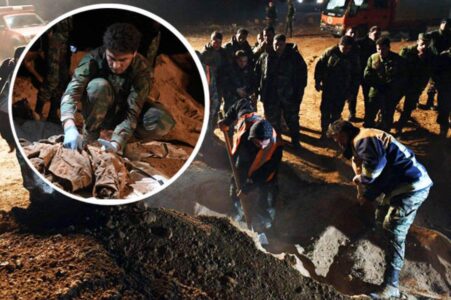
Families of missing Islamic State victims beg for answers as new mass graves are discovered in northeast Syria
As local authorities in northeastern Syria announce the discovery of new mass graves belonging to the victims of Islamic State in Raqqa, families whose loved ones disappeared during the group’s control over the region hope they might finally get some answers.
The First Responders, a rescue and recovery team in northeastern Syria, earlier this month announced finding a mass grave in the western outskirt of Raqqa’s Farusiya, raising the number of discovered sites to five this year.
Following the announcement and the recovery of 16 bodies from the grave, the families of the victims are calling on authorities to prioritize a speedy identification process of the remains.
“The coalition and the Syrian Democratic Forces (SDF) must support The First Responders team with technical support so they would be able to verify the identities of the bodies found in mass graves and under the rubble of buildings that were destroyed during the battle to defeat IS in the city of Raqqa,” said Ensaf Nasser who has been looking for her husband since IS kidnapped him in 2014.
Nasser’s husband, Foad Ahmed el-Mohamed, was a local journalist taking pictures of wounded civilians at Aisha Hospital in Deir el-Zour city when IS militants broke in and took him away. She has since relentlessly perused threads leading to the whereabouts of her husband, without much luck.
Nasser told VOA she has learned that the extremist group accused her husband of infidelity because he advocated for a secular and democratic state instead of a caliphate. He was also accused of breaking their strict Sunni codes by marrying Nasser, who was a follower of Syria’s Druze sect, and naming his son after the Argentinian Marxist revolutionary Che Guevara.
“I have knocked at every door and followed every lead through official channels or personal connections, but I still have no evidence of what happened to him,” Nasser said.
While still hoping to find him alive, she added that if he is found dead, she can at least find closure and honor his memory.
Islamic State kidnapped thousands of civilians, mainly activists, to hush any opposing voice as it prepared to impose its control in 2013, Human Rights Watch said in a report earlier this year. The watchdog said that many victims have vanished during IS expansion in 2014.
The Syrian Network for Human Rights has registered 8,648 cases of kidnapped people, including 319 children and 225 women. Local authorities suspect that many of the missing have likely been killed by IS and buried in graves across the mostly desert terrain of eastern Syria.
Raqqa Civil Council said it has found 28 mass graves since defeating IS’s physical caliphate in 2019. The sites allegedly contain about 6,300 bodies and belong mostly to people executed by IS.
Source: VOA News





